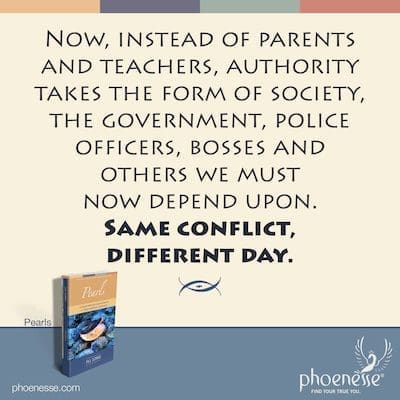Life is like a school. No, that’s not correct; life is a school. We go from one class—or incarnation—to the next, making the grade or else getting held back. The goal is to learn and grow. Knowing this, however, doesn’t solve a single problem. For that, we have to understand our own unique existence. For example, why do we react to authority as we do? Most of us have a lot to learn in this respect.

We face our first conflict with authority at a very young age. Parents, siblings, relatives and later teachers all represent authority whose job is seemingly to say No. Authority then is a hostile denier of wishes. It doesn’t matter how much warmth and affection is also given. And no matter now necessary the prohibition sometimes is. Still, authority represents a hurdle in life.
The attitude a child has towards authority carries over into adulthood. At that point, unconscious reactions to authority are a good purveyor of whether the hurdles will turn into stepping stones toward maturity. When a grown-up shows they can adjust freely to authority, they are showing they have passed a milestone in their soul’s development. Here’s a gold star.
If, however, a person reacts childishly and compulsively to authority, there’s more work to do. Summer school, perhaps? Up until reaching this turning point, a person will react negatively toward authority, even if it’s meted out perfectly. But alas, people are imperfect which means authority is often handled in a less-than-perfect way. Lots to learn for everyone.
So there’s a barrier between the child and the adult in authority. It’s worse if love is lacking or not given the way child would like it. But even if the love is there, the conflict will exist. On one hand, the child wants the parent’s love, and on the other, the child rebels against being restricted. Authority, then, is the hostile force of an enemy locking us behind prison bars and causing frustration.
The child then develops an impatient longing to grow up and become an adult. That way, these restricting walls will go away. But then the child actually does grow up and the face of authority merely changes. Now, instead of parents and teachers, authority takes a new form. It’s society, the government, police officers, bosses and other people in positions of power we must now depend upon. Same conflict, different day.
Back in the days of our childhood, we were torn between wanting love and acceptance, and wanting to fight whoever who was in authority. That’s a tough spot to be in that made it impossible to rebel, or so we thought. As adults, we suffer from this same basic conflict. We either openly rebel against restrictions or face the stigma of being ostracized and despised.
Unfortunately, the ways we usually try to resolve this don’t work. Let’s look at the two basic options all human beings choose from and how they are faulty. Each of the two categories overlap and have many subdivisions. And although we tend to have a favorite, we each play both ends at one time or another. For clarity, we’ll explore them separately. But remember: there’s always a mix.
First, let’s explore those who rebel and revolt. If this is our reaction, we see authority as our enemy. Because many of our desires that were neither bad nor harmful—as kids or later as adults—were forbidden by someone in authority. We think “there’s nothing wrong with what I want,” yet someone said No. Therefore we see authority as unjust and harmful, as well as narrow-minded and unhelpful.
If we feel this way and we have an extroverted nature—along with a healthy dose of chutzpah—our rebellion will be in the form of open fighting and resisting. For others, rebellion will dim to a dull defiance. So this reaction can span the scale from a mild private attitude, to overt social backlash, to associating with an anarchy group or committing crimes. The mildest form may not be noticeable to others. Conversely, we will find the strongest form in one who commits antisocial acts. But the same rebellious feelings simmer underground in either case and create outer tangible effects.
The other category includes those who, at one time or another, turned around and thought, “If I join forces with the one in authority, much as I might hate them, I will be safe”. The extreme type in this category becomes the strict law-upholder, in both overt and subtle ways. It’s possible there will be a strong preference for order and organization, and a desire for peace rather than fighting. In an effort to safeguard our chosen position as a law-upholder and keep our rebelliousness hidden—which deep down is no different from that of the law-breaker—we will stand in rigid opposition to the law-breaker.
The more we fear our tendency to rebel buried inside, the more we, as the law-upholder, will become severe with the law-breaker. After all, we don’t want to expose that part of ourselves that we can see in the law-breaker. In fact, fear of exposing true feelings is exactly what seems so dangerous and risky. It’s why we joined the enemy camp. This fear of exposure motivates the law-upholder to be doubly “good.”
In both cases, there may be true goodness within, but both are reacting ignorantly and immaturely. In the case of the law-upholder, we are acting from fear and weakness. And nothing good can ever come from that. We must make free, strong choices if we are hoping for a positive outcome.
It is a truth that the unconscious of one person has an infinitely stronger effect on another’s unconscious than any surface action or motive ever could. So an act driven by fear will impact someone else more strongly than the same act carried out with a clear recognition of our own inner tendencies. This means that the law-upholder—with their wrong motivations—will have a particularly bad effect on the law-breaker. The more hidden the forces, the more adverse the effect.
Note, the reaction will be quite different—much less rebellious—toward a law-upholder who has healthy, mature motives based on strength instead of weakness. Also note that all this reference to “law-upholders” and “law-breakers” applies in a psychological sense. It’s not only in reference to social laws that everyone is expected to abide.
We humans have a habit of learning that one tendency is wrong. This makes us swing over to the other equally wrong extreme. We need to stop doing this. So don’t misunderstand and conclude that the stance of the law-breaker is more desirable simply because the opposite is also imperfect.
Here’s how these two opposite extremes hook each other in a vicious circle. The bigger the rebellion on the part of the law-breaker, the more intolerant and severe the law-upholder becomes; the latter is trying to protect themselves from their own fear and rebellion. This makes the resistance and rebellion of the law-breaker even greater. The law-breaker isn’t aware of the fact that they’re no longer fighting against the law, as such, or even against the good and true aspect of authority. What they turn against are the false notes of goody-goodyness coming from the equally unaware law-upholder. And so we go round the mulberry bush.
This is a subtle subject, but if we examine our lives it won’t be too hard to figure out which camp we’re mostly in. So then what’s the remedy? If we’re the revolter type, we can meditate on the divine qualities of real authority and how that differs from the imperfect human variety. Perhaps we can only see the distorted version; maybe we’ve never encountered a true authority. Just seeing this can lessen our resistance. Then we won’t mind half as much when the imperfect provider of true laws and authority appears, which is as much for our protection as for anyone else’s. It won’t feel like an enemy force.
This is the way to build a proper concept about authority, so we can sense the wrong kind and not be so reactionary. We’ll see how currents in the “enemy” are also in us, just manifesting differently. This is the process for raising our level of consciousness—our maturity. Then we’ll be able to see the need for law and order, and appreciate the task of the authorities who are there to uphold it. OK, so maybe the ideal of this principle does not abound on planet Earth. Yet. But we still need whatever we currently have. And we need to get our rebellion in check.
As more of us do the work of self-development, we will step more and more into our own authority—although not necessarily on a particular subject. Perhaps we’ve come across someone like this who is very good and wise and kind, without being perfect. Emanations from such a person are not the same as those coming from a law-upholder whose motivation is weakness and fear. But unless we do our own work, we won’t be able to intuitively recognize someone like this. Instead we’ll react automatically against them just because they represent authority. Our own rigid intention to revolt will blind us.
Once we become aware of these two different kinds of authority—the self-righteous kind and the true essence—we can divorce ourselves from our knee-jerk reaction of rejecting all authority. This is how to use our healthy reasoning process to learn to have sound discernment—not just intellectually, but also intuitively.
For people in the law-abider bucket, it may be helpful to search childhood memories to find the times when we revolted. This will help to uncover the memories of when we decided to turn around and jump ship. Sure, there were good motives in doing so, but also weak ones. Search for both. This will shed light on the reaction others have to us; this will loosen the stranglehold on our self-righteous severity towards our brothers and sisters. We will, of course, remain on the side of the law, as we should—both inner law and outer law—but with a softer approach. In this, we will find compassion for the law-breaker so we can help them out of their brand of error.
This explanation about our reaction to authority sheds lights on why Jesus brought so much censure upon himself. He regularly associated with lowly people—common criminals and prostitutes— who didn’t rebel against Jesus because they could sense his true goodness and his understanding of them. Jesus didn’t judge them but instead went with them, in spite of his opposing their wrong acts or attitudes. He could even laugh with them, and also laugh at the wrong kind of pompous authority that is so proud of itself.
Jesus showed us the kind of authority to strive for. We can build common ground with others by seeing how their reaction lives in us, but not setting ourselves up as the judge. This balance is tricky to attain; we can only find it through solving our own inner struggle against authority.
None of this means we shouldn’t punish law-breakers; that would be missing the point. When we’re at the stage of being dangerous to others, we have to learn a lesson. But when things advance this far, we can be sure that the wrong kind of authority has been prevailing too long. The effects of discipline from authority have driven the law-breaker into deeper ignorance and darkness, instead of lifting them out of it.
All our miseries—criminal behavior, wars, diseases and injustices of any kind—are really the result of long-standing faults. So the remedy may not be quick or easy. A whole chain reaction has to be painstakingly unwound to get to the roots of the problem. There we will find a raging vicious circle that has to be clearly understood. Certainly, we have to help and treat the final link in the chain—the parts we can see—and such treatment may be painful and unpleasant. It will be more so if the inner roots aren’t found and exposed. War, for instance, is a tragic last resort that becomes necessary when humanity neglects the search for the roots of our problems.
So it is that common criminals must be prevented from continuing their law-breaking ways, and this must be done by imperfect law-enforcing establishments. If the solution could be found earlier, this drastic step could be avoided. We can all contribute to building a world in which vicious circles get broken before they result in wrongdoing; the cornerstone for this work is to examine our own reactions to authority that, left unchecked, can set an avalanche rolling.
Return to Pearls Contents



